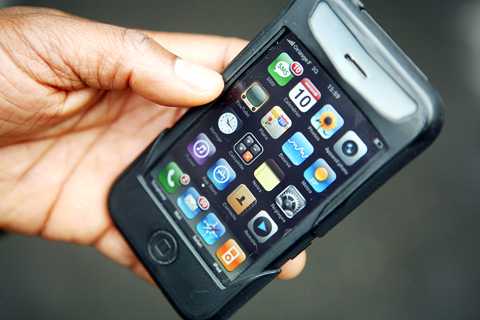Apple sought to reassure the French government on Friday that several recent cases of iPhones cracking and allegedly shattering were not caused by product defects, but were the result of improper handling by users.
French Secretary of State for Trade and Consumer Affairs Herve Novelli met Apple France’s financial director Michel Coulomb to discuss the issue and possible measures, Novelli’s office said.
French media have reported more than 10 cases of iPhone screens cracking or phones exploding.

PHOTO: AFP
Apple’s chief European spokesman, Alan Hely, said the company was investigating “a small number of recent safety reports.”
Hely said no cases of batteries overheating had been detected and that broken screens on the iPhones were caused by too much external pressure applied to the phones.
Novelli, the trade official, appeared to agree with Apple, saying that the “explosions” were not caused by overheated batteries, but by outside pressure.
Novelli said non-Apple experts in the US were examining three problematic iPhones brought from France and were going to test more in the coming days.
France Telecom, which has sold 1.2 million iPhones in France, says it is monitoring the reports of damage but has not taken any measures in response thus far.
The first high-profile case of a malfunctioning phone came early last month, when an iPhone reportedly shattered and sent glass into the eye of an 18-year-old from Aix-en-Provence.
Frank Benoiton of Acheres-la-Foret, south of Paris, said the screen of his wife’s iPhone cracked without warning last week.
“It was not dropped and experienced no unusual shock,” he said.
Benoiton went to Orange France, the telecom company where he bought the phone, to try and get it fixed. He said Orange told him it could not help him because it was caused by the phone user and to contact Apple.
He said Apple France, too, initially said it was a result of user error and that nothing could be done. However, several days later, Benoiton received an e-mail from Apple that his phone would be replaced free of charge.
“I am very satisfied about that. I wasn’t trying to get a new phone, just a new screen, but sure, why not,” he said by telephone.
The European Commission said last week that it spoke to Apple about reports in different EU countries of problems with iPhones and iPods and that the company is investigating.

DOLLAR CHALLENGE: BRICS countries’ growing share of global GDP threatens the US dollar’s dominance, which some member states seek to displace for world trade US president-elect Donald Trump on Saturday threatened 100 percent tariffs against a bloc of nine nations if they act to undermine the US dollar. His threat was directed at countries in the so-called BRICS alliance, which consists of Brazil, Russia, India, China, South Africa, Egypt, Ethiopia, Iran and the United Arab Emirates. Turkey, Azerbaijan and Malaysia have applied to become members and several other countries have expressed interest in joining. While the US dollar is by far the most-used currency in global business and has survived past challenges to its preeminence, members of the alliance and other developing nations say they are fed

LIMITED MEASURES: The proposed restrictions on Chinese chip exports are weaker than previously considered, following lobbying by major US firms, sources said US President Joe Biden’s administration is weighing additional curbs on sales of semiconductor equipment and artificial intelligence (AI) memory chips to China that would escalate the US crackdown on Beijing’s tech ambitions, but stop short of some stricter measures previously considered, said sources familiar with the matter. The restrictions could be unveiled as soon as next week, said the sources, who emphasized that the timing and contours of the rules have changed several times, and that nothing is final until they are published. The measures follow months of deliberations by US officials, negotiations with allies in Japan and the Netherlands, and

Qualcomm Inc’s interest in pursuing an acquisition of Intel Corp has cooled, people familiar with the matter said, upending what would have likely been one of the largest technology deals of all time. The complexities associated with acquiring all of Intel has made a deal less attractive to Qualcomm, said some of the people, asking not to be identified discussing confidential matters. It is always possible Qualcomm looks at pieces of Intel instead or rekindles its interest later, they added. Representatives for Qualcomm and Intel declined to comment. Qualcomm made a preliminary approach to Intel on a possible takeover, Bloomberg News and other media

Foxconn Technology Group (富士康科技集團) yesterday said it expects any impact of new tariffs from US president-elect Donald Trump to hit the company less than its rivals, citing its global manufacturing footprint. Young Liu (劉揚偉), chairman of the contract manufacturer and key Apple Inc supplier, told reporters after a forum in Taipei that it saw the primary impact of any fresh tariffs falling on its clients because its business model is based on contract manufacturing. “Clients may decide to shift production locations, but looking at Foxconn’s global footprint, we are ahead. As a result, the impact on us is likely smaller compared to